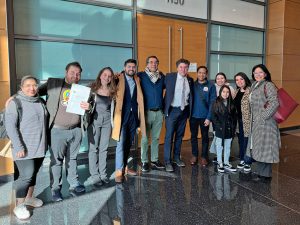By the end of this blog, I want you to be completely convinced that you have all that it takes to be a people’s educator.
What do I mean by “People’s Educator”?
I mean someone who uses education and training to make the world more just, compassionate, and equitable.
Why do I want to convince you of this?
Because as an educator you play an essential role in movements for social change.
You know that in order to create change it’s not enough to be a leader, you must help others become leaders themselves—that is your unique gift as an educator.
You Already Know Enough
If you are reading this thinking, “I’d like to be an educator, but I’m not really an expert on anything” you are not alone!
I considered starting a blog for many years but I didn’t because I’m not the most knowledgeable person on education and social change.
There are plenty of people who know more than me about how people learn, popular education, organizing, social movements, etc.
Like most of you, I’ve been taught that expertise is the most important qualification when teaching on a subject.
But it’s not.
The knowledge of experts is not what makes change happen, it’s how learners use that knowledge.
That’s where you come in.
As an educator, your job is not to be the most knowledgeable person in the room; it’s to pull the knowledge out of the room.
You don’t need to be an expert to make that happen, you need to be an educator.
Silence the Inner Critic
Too many brilliant people think that they don’t know enough to teach the rest of us.
Maybe you don’t have much formal education,
Or maybe you were told you weren’t smart enough;
Or maybe your jobs never gave you the chance to use all your talents and wisdom.
First off, I’m sorry.
Second, I’m here to remind you that the world needs you as a people’s educator!
On the other hand, you might be someone who has had a lot of opportunities.
Maybe you have a lot of formal education;
You’ve always had enough;
You’ve had good jobs and a steady paycheck;
Well, you too can be a people’s educator.
For most of us, there are some ways we’ve been held back and some ways we’ve been helped forward.
History is full of examples of people who experience great and systemic challenges taking leadership alongside people who have been given certain advantages.
The truth is we need everyone to use their unique gifts in service of a better world.
Your leadership is important not in spite of your experience, but because of it.
You Are Not Too Late or Too Early
You might think that you are too young or too inexperienced to teach others;
Or maybe you think that you are too old and too experienced and it’s time to pass the torch.
But if everyone is either too experienced or too inexperienced, then we would have no educators at all!
For every person who is burnt out from years in leadership and has lost the will to change, there is a newbie hungry to share all they are learning about building a better world.
And for every green and righteous activist, convinced they have all the answers, there is a humble leader who knows that leading with questions is not only more enjoyable but also more effective.
(For the record, I’ve been the worst of both.)
The point here is that no matter your age or years of experience, we need you as an educator for the people.
You Are Already An Educator
That’s all great Riahl, but education isn’t really what I do.
Oh, I beg to differ…
Every single leadership role for social change uses education in some way.
Whether you are trying to get more members or you are mentoring a team;
You are raising money from donors or you are creating systems that will improve your team’s effectiveness;
You are building coalitions and partnerships and networks;
You are an educator.
Think about it–
How do you get buy-in from people who don’t yet recognize that your issue (internal or external) is a real issue?
How do you let people know about a solution and help them use it?
How do you incorporate feedback to improve your methods over time?
If you are encouraging others to change the way that they think and act in service of a better world–you are an educator.
The World Needs More Educators
Sometimes I fall into the comparison trap.
I attend another workshop and critique every single thing I can about their analysis or their methodology.
Other times I get jealous of trainers and educators who seem to have more success and attention.
Both feelings come from the lie of scarcity– believing that there are only so many people and ideas and resources to go around.
But if education has the capacity to form more leaders, we need more educators and trainers and facilitators and training organizations, not less.
There are almost 8 billion people on the planet, what if they were all organized and taking leadership for a more just world?
And even if you disqualify all your passive and active opponents and think only about social change organizations…
If the goal of your organization is to:
–Build power
–Grow membership
–Change public opinion
–Change public policy
–Strengthen coalitions
Then your strategy requires effective education and training.
(That is unless you plan to create change all on your own!)
No one has your unique set of talents and even if theirs is similar, the world needs all of you to use them in service of social change.
Finding Your Unique Gifts [Bonus Activity!]
You are already an expert in all kinds of things, but you might not realize it.
Even after reading this blog you still might be unsure exactly what you are uniquely qualified to educate others about.
Well, I have an exercise for you.
It asks you to consider your areas of knowledge, your skills, and your passions.
Once you’ve listed them out, you combine them to find something as unique as your own fingerprint–your expertise.
Check out the activity “You are an Expert” here.
I hope it helps you gain the confidence you need to apply your gifts and help others find their own.
The Only Qualification You Need
Don’t let the activity limit you.
You are always just a few books and a little practice away from expanding your list of knowledge, skills, and passions.
Because, contrary to what we’ve been taught, with preparation, you can teach on any subject.
To educate you only need two things:
1. Enough trust from learners to understand the unique challenges they face;
2. Adequate preparation to help them come up with solutions to those challenges.
This blog is a conversation about how to do so effectively.
So how about you–what doubts or questions stop you from taking leadership as a people’s educator?
Let us know in the comments.





